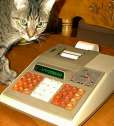Radio Shack PC-8
| Datasheet legend
Ab/c:
Fractions calculation
AC: Alternating current BaseN: Number base calculations Card: Magnetic card storage Cmem: Continuous memory Cond: Conditional execution Const: Scientific constants Cplx: Complex number arithmetic DC: Direct current Eqlib: Equation library Exp: Exponential/log functions Fin: Financial functions Grph: Graphing capability Hyp: Hyperbolic functions Ind: Indirect addressing Intg: Numerical integration Jump: Unconditional jump (GOTO) Lbl: Program labels LCD: Liquid Crystal Display LED: Light-Emitting Diode Li-ion: Li-ion rechargeable battery Lreg: Linear regression (2-var. stats) mA: Milliamperes of current Mtrx: Matrix support NiCd: Nickel-Cadmium recharg. batt. NiMH: Nickel-metal-hydrite rech. batt. Prnt: Printer RTC: Real-time clock Sdev: Standard deviation (1-var. stats) Solv: Equation solver Subr: Subroutine call capability Symb: Symbolic computing Tape: Magnetic tape storage Trig: Trigonometric functions Units: Unit conversions VAC: Volts AC VDC: Volts DC |
| ||||||||||||||||||||||||||||||||||||||||||||||||||||||||
 With this last in their series of eight pocket computer/calculators, Radio Shack returned to using a Sharp model. The PC-8 appears to be the Sharp PC-1246 in OEM guise. What is a bit surprising is that behind a higher model number by Radio Shack, there is this earlier Sharp machine with less memory capacity than the PC-3.
With this last in their series of eight pocket computer/calculators, Radio Shack returned to using a Sharp model. The PC-8 appears to be the Sharp PC-1246 in OEM guise. What is a bit surprising is that behind a higher model number by Radio Shack, there is this earlier Sharp machine with less memory capacity than the PC-3.
On the other hand, the PC-8 has something that I sorely missed in the earlier models: the ability to invoke many advanced functions with a single keystroke (well, two keystrokes to be precise, since you need to use the Shift key.) On the other hand, for some inexplicable reason, the functions they chose to provide shortcuts for happen to be relatively rarely used programming functions, instead of functions you're much more likely to use on a daily basis, such as scientific functions. Well, nobody ever said that these early pocket computers were famous for their ergonomics!
The programming model of the PC-8 is demonstrated by this high-accuracy implementation of the Gamma function:
10:INPUT X 20:Z=ABS X 30:G=2.506628275+6.3E-10+(225.5255846+1.9E-8)/Z-(268.2959738+4.1E-8)/(Z+1) 40:G=G+(80.90308069+3.5E-9)/(Z+2)-(5.007578639+7.1E-10)/(Z+3) 50:G=LN(G+(.011468489+5.435E-10)/(Z+4))+(Z-.5)*LN (Z+4.65)-Z-4.65 60:IF X>0THEN 90 70:RADIAN 80:G=LN (π/X/SIN (π*Z))-G 90:PRINT G,EXP G


